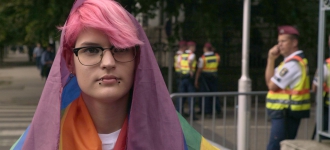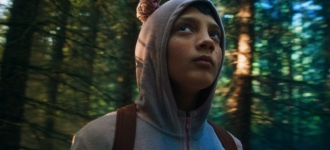Alexa Bakony’s first documentary feature, Colors of Tobi, and the film Her Mothers, co-created by Asia Dér and Sára Haragonics, were selected for this year’s program for their undeniable quality, their humanism and subject. They were also chosen to send a message of solidarity, which is an important part of Verzió’s ethos, and which should come naturally in the art world, yet it does not. Telling the story of a transgender youth, Colors of Tobi was removed, last minute, from the program of the Hungarian Motion Picture Festival this summer with a bogus excuse. The industry did not object, no one withdrew their film, everyone walked the red carpet and celebrated at the reception. A few months later, Her Mothers, a film about a lesbian couple adopting a child, was excluded from the program of the Ars Sacra festival—claiming that the film had been reported (!). Two members of the jury resigned in protest, but the festival went on without any further complaints: awards were given and received. What is most alarming about all of this is not so much the political interference, the level of which we have not seen since the change of the political system in 1989 (although there have been plenty of milder cases), but the disappointing lack of solidarity in the industry. All three of these young directors were students at the University of Theatre and Film Arts, once one of the most important workshops for Hungarian documentary films, which was taken over by the state last year, despite public protest. Our program features a selection in solidarity with and dedicated to the documentary students of the university.
Ideally, a curator shouldn’t have to deal with political issues and make gestures of solidarity— that should be the work of the films. But it’s also not right to keep quiet and pretend nothing has happened. Fortunately, the other works from this year’s selection were not subjected to such disgraceful shows of political power. György Dobray’s irregular love story, The Two of Us, shows the love between two young people with Down syndrome which is so honest and pure it is rarely seen on the screen (or in real life). Árpád Sopsits’s work, The Game of Nerves, recalls the past to communicate its lessons to the present as it looks at how psychiatry was used for political purposes during the Kádár regime. In Flóra Chilton’s documentary-animation seven-minute masterpiece, I Still Remember, young people interview survivors of historic cataclysms, trying to understand the incomprehensible. A similar curiosity permeates the scenes of Sabbath in Shadow, a film recalling the calvary of a Jewish family living in Zakarpattia Oblast. Today’s youth—of generations X, Y, Z—star in two exciting works from Makabor Studio. The young adults shown in My Digital Nomad (by Kata Oláh) wander the world; their home, wherever they plug-in their laptops. The twenty-year-old heroines of Divas, on the other hand, do not go anywhere, but, on the verge of adulthood, are actually homeless—trying to find their place in the world. The director, Máté Kőrösi is a graduate of the University of Theatre and Film Arts, just like Ábel Visky, whose Tales from the Prison Cell was awarded at multiple festivals. The screenplay was co-created by incarcerated fathers, who wrote stories for their children. The stories come together as a documentary-animation of an unusual genre.
Program curator: György Báron




















